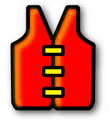Key Safety Information
Office of Boating Safety
Quick Links

Wear a lifejacket or PFD
Research has shown that unexpected immersion in water can place a boater at serious risk if they are not wearing a flotation device to assist them in those first moments. This is true regardless of the experience of the boater, the nearness to shore and even swimming ability. The body's reaction to the surprise of going overboard and the shock of cold water can profoundly affect breathing, nerves and muscle strength. Wearing a lifejacket gives you time to adjust to the emergency and allows you to assist others. Buckle up before getting on board.
Find more info on lifejackets and personal flotation devices (PFDs) in the Equipment section.
Overboard recovery techniques
Surviving in cold water
Don’t cruise with booze
Besides the possible legal consequences, mixing alcohol and boating is far more dangerous than you may realize. Fatigue, sun, wind and the motion of the boat dull your senses. Alcohol intensifies these effects, leaving you with poorer fine motor skills (for example, hand-eye coordination) and impaired judgement.
Take a course
Take an accredited Canadian boating course
Be prepared!
Check the forecast for weather and water conditions before heading out and keep a watchful eye out for changing conditions
Study and carry your marine charts
Inspect all your equipment before departure
Ventilate all areas where fumes may accumulate - Learn more about CO (carbon monoxide) and ignition protection
Leave a trip/rescue plan with a responsible person
In an emergency
Marine and Air Search and Rescue emergency telephone numbers
- Date modified: